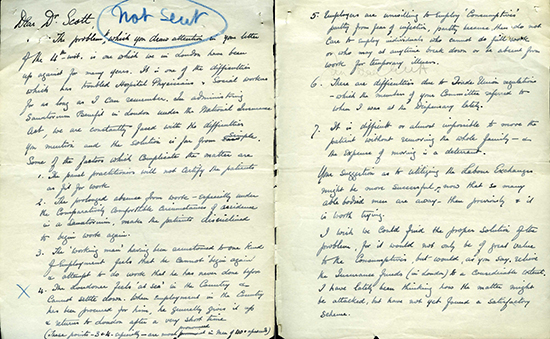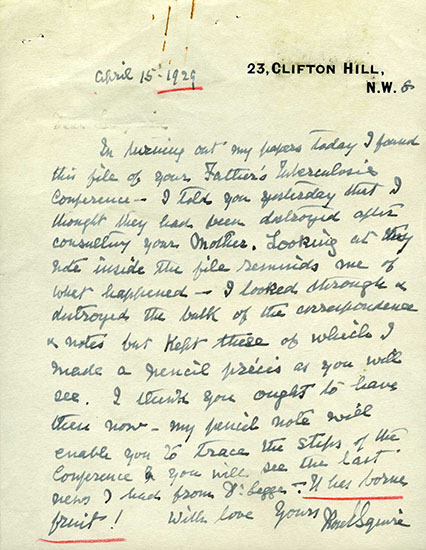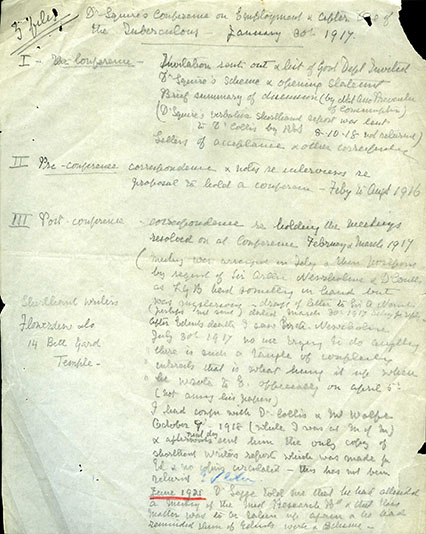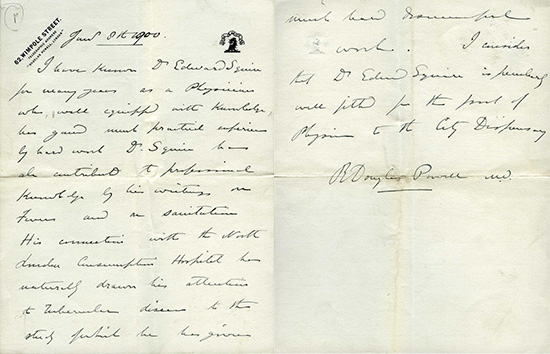For two weeks in January 2019, Kate Doughty joined the RCP library, archive and museum services team on a placement from an MA degree in archives and records management at the University of Liverpool. In this post, she writes about one of the collections she helped to catalogue.
It’s always an exciting prospect, opening the lid of the box of an uncatalogued collection. You never know what you might find. In this case I was not disappointed; being confronted with a lovely little collection of papers from a distinguished doctor from over a century ago.
The papers were of J Edward Squire (1855–1917), a consulting physician and Fellow of the RCP who worked tirelessly to further the sanatorium movement. He attempted to revolutionise the after-care of discharged patients following their recovery from consumption (tuberculosis). Patient aftercare was a lifelong interest for Squire, who first worked extensively with tuberculosis patients from 1882 at the North London (later the Mount Vernon) Hospital for Consumption, directly after graduating from his medical studies in 1881.
The majority of the collection dates from the few years surrounding 1917, when Squire organised and held a conference ‘On the after care and employment of tuberculous persons’ at Westminster City Hall, Charing Cross, on 30th January 1917, presided over by Lord Balfour of Burleigh.
This conference, though strictly informal, was well attended and, from the verbatim minutes, fruitful discussion was had. The report marks numerous stances from the professionals present (MS6022). Mr Woolcombe, for example, raises employers’ concerns that every person who has had tuberculosis is infectious, and encourages “a sort of crusade to educate public opinion as to really the lack of danger there is in employing these people” (MS6022 p.24). There is a wide acknowledgment from the committee members that both medical and industry professionals must work together if they are to truly help patients in the long-term.
Dr Newsholme suggested that there should soon be a much longer formal conference involving roundtable discussions, in order that “the matter could be adequately thrashed out” (MS6022 p.27). Ultimately, the day’s final resolution was to form a coordinating body to continue advancing the cause embarked upon, initially involving Dr Squire, Dr Collis, and Lord Balfour as the leaders.
It is interesting to note the time and place of the conference: being in the capital city in the middle of wartime makes it particularly pressing that as many people should be in work as possible, and such a practical undercurrent may have acted as a catalyst in the drive to enlist further support for the scheme.

J Edward Squire’s enthusiasm and determination to modernise patient aftercare is obvious when viewing his papers; his ardent interest in those both directly and indirectly affected by the disease shines through his words. Dr Scott of the Stepney Dispensary (MS6021/5) makes the suggestion that tuberculosis patients could be relocated from London ‘to the country’ to continue their recovery. In his written but unsent reply, Squire outlines several reasons as to why this would not be possible. It is clear that Squire considers his patients as individuals, with families and lives outside their disease, when he asserts: ‘the Londoner feels “at sea” in the Country and cannot settle down’, and ‘It is difficult or almost impossible to move the patient without removing the whole family – the expense of moving is a deterrent’ (MS6021/5).

The final folder relating to the conference consists mainly of thanks and requests, congratulating or apologising depending upon the attendance of the writer. It seems that much interest was piqued and motivation rallied for the cause, with sufficient momentum generated to continue the work. Organisations such as insurance committees, the Home Office, and the National Service Department were particularly interested, and letters from these bodies can be found; each eagerly awaiting further news of the pioneering work being carried out (MS6023/1).
This momentum for assisting tuberculosis sufferers back into employment comes to an unfortunate and abrupt halt within the collection, however, when Squire’s death is announced as on 2 May 1917, just months after the meeting. From here, his family begin corresponding with his colleagues to ensure the work is not abandoned by others after the loss of their frontrunner. There is a poignant note dated 1929 from Rosel Squire – Edward’s sister – to her niece providing a ‘pencil précis as you will see’ (MS6023/7) of the conference files now kindly donated to the RCP’s archives.

The collection came into the care of the RCP archive in 1970, following a kind donation from Edward Squire’s daughter Hilda. Her correspondence with the then President Max Rosenheim is available as part of a different series (MS2000/100-102A) and outlines the donation process.
The main other aspect of the collection consists of an assortment of letters to both Edward and his father, Dr William Squire, from their respective time in practice. These have been split by recipient, and form an intriguing feature of the collection. Many of the documents are testimonials and have accumulated over several years, making it particularly touching (MS6024). The commendation from Sir Richard Douglas Powell who boasted titles such as Physician-Extraordinary to Queen Victoria, and Censor, then President, of the Royal College of Physicians, is a particularly prominent one. It is impressive to see how highly regarded this family of doctors were by their contemporaries, and how carefully members of the family have worked to preserve each other’s professional and private memories.

The J Edward Squire collection has been a privilege to work on. You can see the details on the online catalogue, and the collection can be consulted in person by appointment in the library reading room.
Kate Doughty, archives placement student
